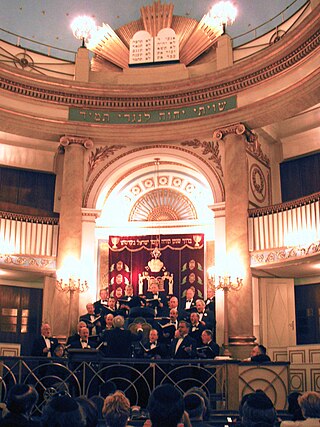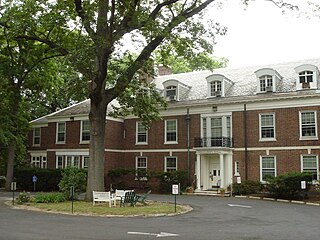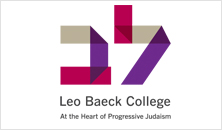Related Research Articles

Judaism is an Abrahamic monotheistic ethnic religion that comprises the collective spiritual, cultural, and legal traditions of the Jewish people. Along with Samaritanism, to which it is closely related, Judaism is one of the two oldest Abrahamic religions.

Jacob Neusner was an American academic scholar of Judaism. He was named as one of the most published authors in history, having written or edited more than 900 books.

Mordecai Menahem Kaplan was an American Modern Orthodox rabbi, writer, Jewish educator, professor, theologian, philosopher, activist, and religious leader who founded the Reconstructionist movement of Judaism along with his son-in-law Ira Eisenstein. He has been described as a "towering figure" in the recent history of Judaism for his influential work in adapting it to modern society, contending that Judaism should be a unifying and creative force by stressing the cultural and historical character of the religion as well as theological doctrine.

Reconstructionist Judaism is a Jewish movement based on the concepts developed by Rabbi Mordecai Kaplan (1881–1983) that views Judaism as a progressively evolving civilization rather than just a religion. The movement originated as a semi-organized stream within Conservative Judaism, developed between the late 1920s and the 1940s before seceding in 1955, and established a rabbinical college in 1967. Reconstructionist Judaism is recognized by many scholars as one of the five major streams of Judaism in America alongside Orthodox, Conservative, Reform, and Humanistic.

Solomon Schechter was a Moldavian-born British-American rabbi, academic scholar and educator, most famous for his roles as founder and President of the United Synagogue of America, President of the Jewish Theological Seminary of America, and architect of American Conservative Judaism.
A rabbi is a spiritual leader or religious teacher in Judaism. One becomes a rabbi by being ordained by another rabbi—known as semikha—following a course of study of Jewish history and texts such as the Talmud. The basic form of the rabbi developed in the Pharisaic and Talmudic eras, when learned teachers assembled to codify Judaism's written and oral laws. The title "rabbi" was first used in the first century CE. In more recent centuries, the duties of a rabbi became increasingly influenced by the duties of the Protestant Christian minister, hence the title "pulpit rabbis", and in 19th-century Germany and the United States rabbinic activities including sermons, pastoral counseling, and representing the community to the outside, all increased in importance.

The Jewish Theological Seminary (JTS) is a Conservative Jewish education organization in New York City, New York. It is one of the academic and spiritual centers of Conservative Judaism and a center for academic scholarship in Jewish studies. The Jewish Theological Seminary Library is one of the most significant collections of Judaica in the world.

A yeshiva is a traditional Jewish educational institution focused on the study of Rabbinic literature, primarily the Talmud and halacha, while Torah and Jewish philosophy are studied in parallel. The studying is usually done through daily shiurim as well as in study pairs called chavrusas. Chavrusa-style learning is one of the unique features of the yeshiva.

A hazzan or chazzan is a Jewish musician or precentor trained in the vocal arts who leads the congregation in songful prayer. In English, this prayer leader is often referred to as a cantor, a term also used in Christianity.
Jewish religious movements, sometimes called "denominations", include diverse groups within Judaism which have developed among Jews from ancient times. Today in the west, the most prominent divisions are between traditionalist Orthodox movements and modernist movements such as Reform Judaism originating in late 18th century Europe, Conservative originating in 19th century Europe, and other smaller ones, including the Reconstructionist and Renewal movements which emerged later in the 20th century in the United States.

The Hebrew Union College – Jewish Institute of Religion is a Jewish seminary with three locations in the United States and one location in Jerusalem. It is the oldest extant Jewish seminary in the Americas and the main seminary for training rabbis, cantors, educators and communal workers in Reform Judaism. HUC-JIR has campuses in Cincinnati, Ohio, New York City, Los Angeles, and Jerusalem. The Jerusalem campus is the only seminary in Israel for training Reform Jewish clergy.
Jewish studies is an academic discipline centered on the study of Jews and Judaism. Jewish studies is interdisciplinary and combines aspects of history, Middle Eastern studies, Asian studies, Oriental studies, religious studies, archeology, sociology, languages, political science, area studies, women's studies, and ethnic studies. Jewish studies as a distinct field is mainly present at colleges and universities in North America.
Jewish leadership has evolved over time. Since the destruction of the Second Temple in Jerusalem in 70 CE, there has been no single body that has a leadership position over the entire Jewish diaspora. Various branches of Judaism, as well as Jewish religious or secular communities and political movements around the world elect or appoint their governing bodies, often subdivided by country or region.

The Reconstructionist Rabbinical College (RRC) is a Jewish seminary in Wyncote, Pennsylvania. It is the only seminary affiliated with Reconstructionist Judaism. It is accredited by the Commission on Higher Education of the Middle States Association of Colleges and Schools. RRC has an enrollment of approximately 80 students in rabbinic and other graduate programs.

Torah Umesorah – National Society for Hebrew Day Schools is an Orthodox Jewish educational charity based in the United States that promotes Torah-based Jewish religious education in North America by supporting and developing a loosely affiliated network independent private Jewish day schools.
A Jewish seminary, better known as a rabbinical seminary or rabbinical school, is a Jewish educational institution for the purpose of training rabbis. While rabbis have been part of Judaism for centuries, rabbinical seminaries only became distinct institutions in the early 19th century.

Leo Baeck College is a privately funded rabbinical seminary and centre for the training of teachers in Jewish education. Based now at the Sternberg Centre, East End Road, Finchley, in the London Borough of Barnet, it was founded by Werner van der Zyl in 1956 and is sponsored by The Movement for Reform Judaism, Liberal Judaism and the United Jewish Israel Appeal. It is named after the inspirational 20th-century German Liberal rabbi Leo Baeck.
The Institute of Traditional Judaism, also known as The Metivta or the ITJ, was the rabbinical school sponsored by the Union for Traditional Judaism.
The Center for Jewish Studies Heidelberg is an accredited institution of higher learning, supported by the Central Council of Jews in Germany and funded by the German federal government. The HfJS operates in close cooperation with the University of Heidelberg and opens its doors to students and scholars, regardless of religious affiliation.
References
- ↑ "About Us". www.ajr.edu. Accessed 2023-10-04.
- ↑ Wiener, S. (1997). A rabbinate for Clal Yisrael: The academy for Jewish religion. Sh'ma. 27/528. 6-7.
- ↑ Rammenzweig, G. (1995). Church and Conflict in the Process of Pastoral Training. European Judaism: A Journal for the New Europe, 28(1), 73-77.
- ↑ "History - Academy for Jewish Religion". Academy for Jewish Religion. Retrieved 22 November 2015.
- ↑ "Accreditation - Academy for Jewish Religion." Academy for Jewish Religion. Retrieved December 17, 2020.
